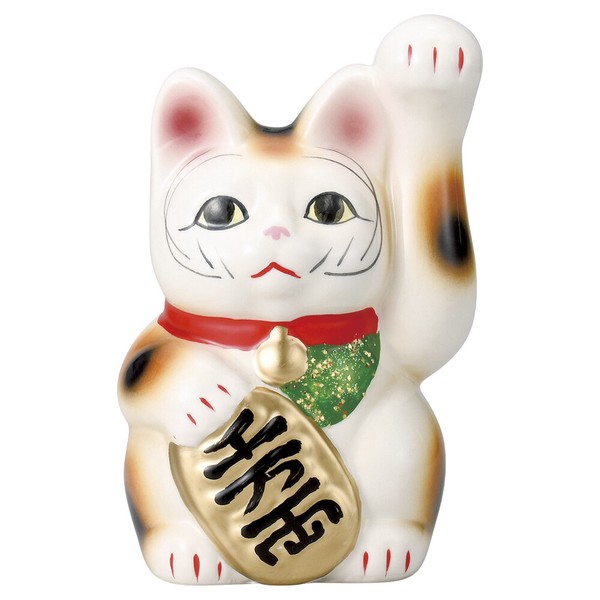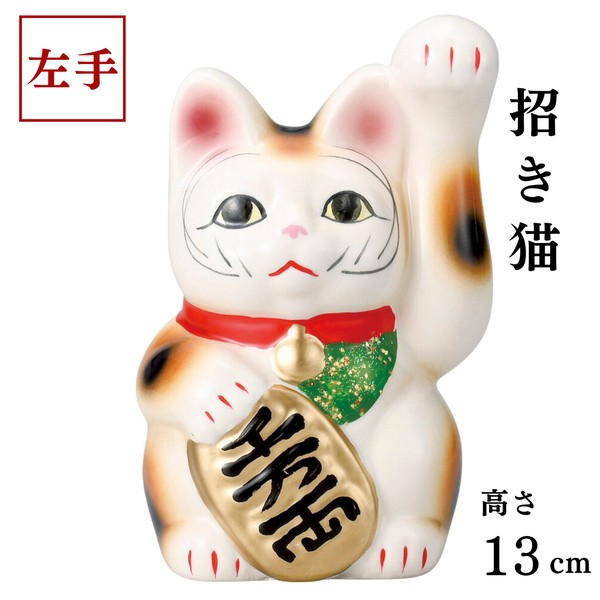


Vendor Profile
Mitsui Pottery Inc.
| Address | 1084 Dachi-chou Toki-shi Gifu, JAPAN ZIP:509-5401 |
|---|---|
| Representative Name | Toshihiro Fujii |
| Annual Revenue | closed |
| No. of Employees | 5 |
| Web Site URL |





People Also Searched
SD item code:7858094
| Detail | Price & Quantity | ||
|---|---|---|---|
| S1 |
Ten Million Ryotei Long White Cat (left), beckoning cat, 13.5cm
千万両手長白猫(左)招き猫 13.5cm
(87520-579)
|
(87520-579)
Wholesale Price: Members Only
1 pc /set
Sold Out
|
|
| Dimensions |
|---|
|
13.5cm
|
| Specifications |
|---|
|
Country of manufacture: Japan
Material / component: ceramic
Package: Delivered in eco-friendly packaging.
|
Description
| 〜Seto ware has a history of 1,300 years. The beckoning cat has long been loved as a good-luck charm that brings prosperity in business, happiness in the family, and the arrival of many customers. Although wild cats have inhabited Japan since ancient times, there were no domestic cats as pets as we know them today. Cats as domesticated cats came to Japan during the Nara period (710-794). They came to Japan with Buddhism from China. It is said that they were carried on ships to protect Buddhist scriptures and books from rodent damage. The earliest mention of cats is found in "Nihon ryoiki" written in the early Heian period (794-1185), and there are descriptions of domesticated cats in "Pillow Book" and "Tale of Genji", suggesting that cats were familiar to people at least in the Heian period. [White beckoning cat] White beckoning cats are believed to bring good fortune. [Manekineko with its left hand raised] A beckoning cat with its left hand raised is a cat that [invites people]. For this reason, it is often placed in restaurants, service businesses, and other establishments that want many customers to come. There is also a difference in the height of the raised hand. Those with their hands raised above their ears are called [te-chou], and those with their hands modestly raised below their ears are called [te-shou]. It is believed that the longer the hands are extended, the more distant or great good fortune is invited, and the shorter the hands are, the more familiar or modest happiness is invited. The image of a beckoning cat is that of holding a koban, but early beckoning cats did not have a koban, and most of them had a bell hanging from their collars. It is said that this bell gradually changed to a koban. The koban is painted with an amount of money and auspicious words such as "kaiun" (good luck) and "sho-fuku" (good fortune), directly reflecting the wish that was put into the beckoning cat. It is interesting to note that the amount of money depicted on the koban has increased over time from [senryo] [ten thousand ryo] [ten thousand ryo] to [billion ryo]. The more modest the amount, the older the koban is considered to be, basically. Where do you put it, east, west, north, south, south, east? z The basic place to place a beckoning cat is in front of a store if you are in a store, or at the front door if you are at home. This is the place where you can invite good fortune and luck to come to you. If you place it at home, you can also place it in the living room or some other place where the family can see it often. |
More
| Shipping Method | Estimated Arrival |
|---|---|
| Sea Mail | From Jun.3rd to Aug.6th |
| Air Mail | From May.16th to May.20th |
| EMS | From May.15th to May.20th |
| Pantos Express | From May.17th to May.22nd |
| DHL | From May.15th to May.17th |
| UPS | From May.15th to May.17th |
| FedEx | From May.15th to May.17th |
|
Some trading conditions may be applicable only in Japan.
Due to the nature of pottery, there may be variations in color. Also, the size may vary slightly due to shrinkage of the clay. Please enjoy the different appearance of each piece. [About Stock]
We share inventory with some manufacturers. We update our inventory regularly, but it may be temporarily out of stock. However, there may be times when we have no choice but to cancel your order due to a temporary shortage of stock. Please contact us if you would like to know the latest stock status. |
The beckoning cat has long been loved as a good-luck charm that brings prosperity in business, happiness in the family, and the arrival of many customers.
Although wild cats have inhabited Japan since ancient times, there were no domestic cats as pets as we know them today. Cats as domesticated cats came to Japan during the Nara period (710-794). They came to Japan with Buddhism from China. It is said that they were carried on ships to protect Buddhist scriptures and books from rodent damage.
The earliest mention of cats is found in "Nihon ryoiki" written in the early Heian period (794-1185), and there are descriptions of domesticated cats in "Pillow Book" and "Tale of Genji", suggesting that cats were familiar to people at least in the Heian period.
[White beckoning cat]
White beckoning cats are believed to bring good fortune.
[Manekineko with its left hand raised]
A beckoning cat with its left hand raised is a cat that [invites people]. For this reason, it is often placed in restaurants, service businesses, and other establishments that want many customers to come.
There is also a difference in the height of the raised hand. Those with their hands raised above their ears are called [te-chou], and those with their hands modestly raised below their ears are called [te-shou]. It is believed that the longer the hands are extended, the more distant or great good fortune is invited, and the shorter the hands are, the more familiar or modest happiness is invited.
The image of a beckoning cat is that of holding a koban, but early beckoning cats did not have a koban, and most of them had a bell hanging from their collars. It is said that this bell gradually changed to a koban. The koban is painted with an amount of money and auspicious words such as "kaiun" (good luck) and "sho-fuku" (good fortune), directly reflecting the wish that was put into the beckoning cat. It is interesting to note that the amount of money depicted on the koban has increased over time from [senryo] [ten thousand ryo] [ten thousand ryo] to [billion ryo]. The more modest the amount, the older the koban is considered to be, basically.
Where do you put it, east, west, north, south, south, east? z
The basic place to place a beckoning cat is in front of a store if you are in a store, or at the front door if you are at home. This is the place where you can invite good fortune and luck to come to you. If you place it at home, you can also place it in the living room or some other place where the family can see it often.
招き猫は商売繁盛・家内円満・千客万来をもたらす縁起物として永く愛用されています。
<招き猫の歴史>
日本には野生の山猫は昔から生息していたものの、今でいうペットとしての家猫は存在していなかった。飼い猫としての猫が日本にやってきたのは奈良時代。中国から仏教とともに日本にやってきた。仏教の経典や書籍などを鼠の被害から守るため船に乗せられて来たといわれている。
平安初期に書かれた『日本霊異記』に猫に関する最古の記述があり、『枕草子』や『源氏物語』には飼い猫にまつわる描写があることから、少なくとも平安時代には身近な存在になっていたことがうかがえる。
<白い招き猫>
白い招き猫は、福を呼ぶとされています。
<左手を上げている招き猫>
左手を上げている招き猫は「人を招く」猫。そのため、飲食店やサービス業など、お客さんにたくさん来てほしい店に置かれることがよくあります。
<あげてる手の長さの意味>
また、上げている手の高さにも違いがある。耳よりも上まで手が上がっているものを「手長」、耳よりも下に控えめに手を上げているものを「手短」と呼び、手が長く伸びているほど遠くの福や大きな福を招き、短いものは身近な福やささやかな幸せを招くとされている。
<持ち物が表す意味>
招き猫といえば小判を持っているイメージだが、初期の招き猫には小判はなく、首輪に鈴をぶら下げた姿がほとんどだった。この鈴が次第に小判へと変わっていったといわれている。小判には金額や「開運」「招福」といった縁起のよい言葉が描かれており、招き猫に込めた願いがダイレクトに反映されている。面白いのが、小判に描かれた金額が時代とともに「千両」「万両」から「億万両」にまで跳ね上がっていくところだ。控えめな金額であるほど、基本的には古いものと考えられる。
〇東西南北、どこに置く?〇
招き猫を置く場所の基本は、お店なら店先、自宅なら玄関。外にいる福や運をおいでおいでと招くことができる場所です。また、自宅に置く場合はリビングなど、家族がよく目にする場所に置くのもOK。